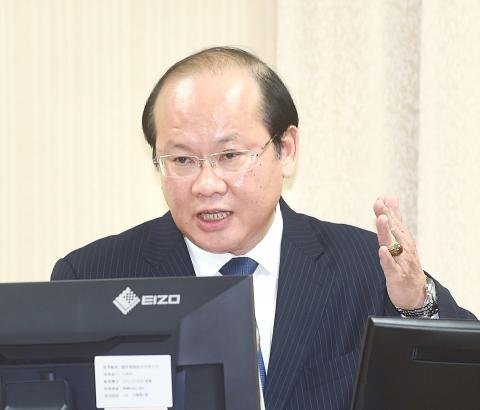Some media outlets in Taiwan are “on the same path” as China and are sources of false information, National Security Bureau Deputy Director-General Chen Wen-fan (陳文凡) said yesterday, without specifying which outlets.
Chen made the comments while presenting a report at a meeting of the Legislative Yuan’s Foreign Affairs and National Defense Committee in Taipei.
In the bureau’s report, it created a new term, “media on the same path,” going as far as to say that such media outlets exist online, in print and through wanghong (網紅, Internet celebrities), Chinese Nationalist Party (KMT) Legislator Lu Yu-ling (呂玉玲) said.

Photo: Fang Pin-chao, Taipei Times
She called on Chen to name the media outlets instead of only telling “half the story.”
“Otherwise, the National Security Bureau itself would be fake news,” Lu added.
Chen said he was not trying to sway public opinion, but was stating the truth.
Due to various considerations and the nature of intelligence work, he could not publicly name the outlets at this stage, he said, adding that he could only reveal that the problem exists.
While being questioned by Democratic Progressive Party Legislator Lo Chih-cheng (羅致政), Chen also said that the tone of the outlets was similar to that of China’s state media.
Asked by Lo whether he “dared” to release the names of the outlets, Chen said that he would do so when it becomes necessary.
Meanwhile, New Power Party Legislator Huang Kuo-chang (黃國昌) accused Want Want China Times Group (旺旺中時媒體集團) of “selling the news like advertisements” and “taking money from the Chinese government,” adding that this was something he had “exposed” while he was an academic.
To put it nicely, it would be considered “placement marketing,” and to put it harshly, it would be considered “trampling on journalistic professionalism,” he said.
While he was researching the topic as an academic, an unnamed reporter allegedly made a telephone call to discuss how they would be paid, he said, adding that there is an audio recording of the call.
Under the Act Governing Relations Between the People of the Taiwan Area and the Mainland Area (臺灣地區與大陸地區人民關係條例), if someone sells domestic news to the Chinese government, they could only be fined NT$100,000 to NT$500,000, Huang said.
What the people want to see is not that government agencies are always “researching,” but that they are taking specific action, Huang said.
He urged the Mainland Affairs Council and other agencies to state that they cannot accept “this kind of law,” referring to the act, and to push for amendments as soon as possible.
Meanwhile, National Communications Commission spokesman Wong Po-tsung (翁柏宗) yesterday denied that a draft media monopolization prevention act is meant to undercut the influence of Chinese funding on the nation’s news outlets.
The bill would require TV news channels to disclose their sources of advertising revenue, and shareholders with at least a 10 percent stake in news channels would be obligated to disclose any other businesses they have.
“The clause is designed to preserve the professionalism and independence of news media,” Wong said.
Additional reporting by Shelley Shan

ACTION PLAN: Taiwan would expand procurement from the US and encourage more companies to invest in the US to deepen bilateral cooperation, Lai said The government would not impose reciprocal tariffs in retaliation against US levies, President William Lai (賴清德) said yesterday, as he announced five strategies to address the issue, including pledging to increase Taiwanese companies’ investments in the US. Lai has in the past few days met with administrative and national security officials, as well as representatives from various industries, to explore countermeasures after US President Donald Trump on Wednesday last week announced a 32 percent duty on Taiwanese imports. In a video released yesterday evening, Lai said that Taiwan would not retaliate against the US with higher tariffs and Taiwanese companies’ commitments to

Intelligence agents have recorded 510,000 instances of “controversial information” being spread online by the Chinese Communist Party (CCP) so far this year, the National Security Bureau (NSB) said in a report yesterday, as it warned of artificial intelligence (AI) being employed to generate destabilizing misinformation. The bureau submitted a written report to the Legislative Yuan in preparation for National Security Bureau Director-General Tsai Ming-yen’s (蔡明彥) appearance before the Foreign Affairs and National Defense Committee today. The CCP has been using cognitive warfare to divide Taiwanese society by commenting on controversial issues such as Taiwan Semiconductor Manufacturing Co’s (TSMC, 台積電) investments in the

‘SPECIAL CHANNEL’: Taipei’s most important tasks are to stabilize industries affected by Trump’s trade tariffs and keep negotiations with Washington open, a source said National Security Council Secretary-General Joseph Wu (吳釗燮) arrived in the US for talks with US President Donald Trump’s administration, a source familiar with the matter said on Friday. Wu was leading a delegation for a meeting known as the “special channel,” the Financial Times reported earlier. It marked Trump’s first use of the channel since returning to the White House on Jan. 20. Citing a source familiar with the matter, the Financial Times reported that Minister of Foreign Affairs Lin Chia-lung (林佳龍) was also a part of the delegation. The visit came days after China concluded war games around Taiwan and amid Trump’s

HELPING HAND: The steering committee of the National Stabilization Fund is expected to hold a meeting to discuss how and when to utilize the fund to help buffer the sell-off The TAIEX plunged 2,065.87 points, or 9.7 percent, to close at 19,232.35 yesterday, the highest single-day percentage loss on record, as investors braced for US President Donald Trump’s tariffs after an extended holiday weekend. Amid the pessimistic atmosphere, 945 listed companies led by large-cap stocks — including Taiwan Semiconductor Manufacturing Co (TSMC, 台積電), Hon Hai Precision Industry Co (鴻海精密) and Largan Precision Co (大立光) — fell by the daily maximum of 10 percent at the close, Taiwan Stock Exchange data showed. The number of listed companies ending limit-down set a new record, the exchange said. The TAIEX plunged by daily maxiumu in just